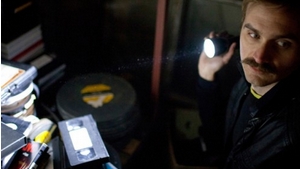Watching Andrew Stanton’s adaptation of Edgar Rice Burroughs’ seminal science fiction pulp novel, A Princess of Mars– here blandly labeled John Carter– is equivalent to a genre-fueled out of body experience. You’ve seen this film before. You’ve seen it in Star Wars (both the original trilogy and the prequel films), you’ve seen it in Avatar, you’ve seen it in Superman. John Carter‘s influences read so blatantly that watching the film feels akin to playing a movie association game in which elements from its plot and narrative are connected to those of other essential sci-fi blockbusters. What we’re really watching, of course, is the big-screen arrival of the story that informed each of those aforementioned properties and more;…
-
-
G-S-T Review…Snow White and the Huntsman
There’s little ingenious, clever, or new about a dark fairy tale; the grisly and the horrific have been hallmarks of such folkloric narratives since the Brothers Grimm put pen to paper two hundred years ago. In that same respect, there’s nothing overtly offensive about them either, at least not at face value, as a veneer of darkness in contemporary fairy tale fare can just be interpreted as a dedication to tradition. Faithfulness to either tone or detail does not comprise one of Snow White and the Huntsman‘s glaring flaws, however; for just shy of two hours, the film tries gamely to assert itself as worthy sword-and-sorcery filmmaking. At times, it…
-
New Feature: The Criterion Files – Cul-De-Sac/Metropolitan
A bit of a foreword for Go, See, Talk! viewers who are unfamiliar with the Criterion Files: I started this series over at A Constant Visual Feast back in February of this year as a way of covering older ground as well as some contemporary territory in cinema by delving into the massive and varied assortment of films gathered together in the much-vaunted Criterion Collection. In each Files entry, I’ll talk about two different Criterion releases– not necessarily connected by anything other than bearing the Criterion seal of approval– speaking to the films themselves and possibly their contexts and positions in film history. Think of it as me doing my…
-
G-S-T Review…Chernobyl Diaries
Curiously enough, Chernobyl Diaries may mark the first non-found footage found footage film. While constructed using mostly a straight narrative approach, there’s a nagging sense that this cautionary horror jaunt (penned and backed by Paranormal Activity mastermind Oren Peli) may have actually benefited from more fully embracing the tricky conceit; it’s shot like a found footage movie, it’s crafted like a found footage movie, it scares like a found footage movie, and the title’s reference to “diaries” naturally leads us to conclude that someone, somewhere, came across the footage we’re watching by unhappy accident. But those eponymous documents are nowhere to be found in an hour and a half of story. Chernobyl Diaries bases…
-
G-S-T Review…Battleship
If you feel the need to blame someone for the birth, production, and release of Battleship— as I do– look no further than Michael Bay. The proprietor of shining contemporary examples of big spectacle gone very, very stupid, Bay brought the “movies based on toy lines” movement to life in 2007 with Transformers; two sequels and a G.I. Joe film later (which itself is getting sequelized this summer), and that childish aesthetic shows no signs of abating in the near future. Battleship proves to be the loudest and dumbest toy-to-cinema adaptation yet (barring last year’s Transformers: Dark of the Moon), a soulless, pointless, hollow cacophony of trite cliches and boring…
-
G-S-T Review…Dark Shadows
A common fact easily overlooked: television isn’t the same medium as film. As modes of visual storytelling, they may bear a family resemblance, but they represent long-form versus short-form approaches to narrative. In short, the rules, as well as the limitations and advantages, differ greatly for both. A television show has room to breathe and stretch its legs by its very nature, for example, while a movie is more contained by its own. Conflating the two, then, is a mistake, and one which Tim Burton makes repeatedly throughout Dark Shadows, his interpretation of the identically-titled 1960s/70s televised Gothic soap opera; the result is so overstuffed and hopelessly rushed that there’s…
-
[IFFBoston Review]…Ai Weiwei: Never Sorry
There’s a degree to which the story of Chinese artist-activist Ai Weiwei– filtered through the lens of director Allison Klayman– is incomprehensible. Not in terms of our ability to latch onto and absorb the information Klayman conveys to us, mind; referring to craft and technique, Ai Weiwei: Never Sorry has much and more to recommend it. Supporting all of that is the compelling narrative Klayman constructs about Ai’s life, career, and confrontations with Chinese authorities, and that final detail represents the element that makes the film so difficult to process. Ai, perceptive, compassionate, and endlessly clever, lives in a world where creative expression can lead to a person vanishing into…
-
[IFFBoston Review]…We Are Legion: The Story of the Hacktivists
Brian Knappenberger’s We Are Legion: The Story of the Hacktivists is a lot of things, but first and foremost it’s an outstanding example of documentary filmmaking done perfectly; it’s exciting, it’s propulsive, it’s entertaining, and it’s insightful. Documentaries should be educational and thorough as a rule, and We Are Legion doesn’t disappoint in that respect, but Knappenberger’s film– despite all of its historical and academic value– regardless manages to carry out its purpose with tongue firmly in cheek. And maybe there’s a point to that. After all, there’s something intrinsically bizarre about the idea that Knappenberger’s subject, the online, multi-faceted group of prankster-activists, Anonymous, actually has become a genuine catalyst for…
-
[IFFBoston Review]…V/H/S
V/H/S could very well represent the pinnacle of found footage horror cinema. Actually, it may be fairer to think of the film a “do this, not that” instructional presentation to other aspiring horror filmmakers. In turns, V/H/S demonstrates both how to do found footage well and how to fail miserably maneuvering within the sub-genre’s cinematic mode; in fits and spurts, the film is tense and incredibly scary, but when it doesn’t work, it really, truly does not work in the most embarrassing and chagrin-inducing ways possible. That’s a risk of omnibus/anthology filmmaking. Assemble a ragtag team of five different directors—David Bruckner, Adam Wingard, Ti West, Joe Swanberg, Glenn McQuaid, and…
-
[IFFBoston Review]…Polisse
Think of Polisse as a towering and worthy successor to television shows like The Shield and, far more accurately, The Wire. Dedicated to portraying its events and characters by way of a realistic mien, the film revolves around the lives of the Paris CPU (Child Protection Unit) both on the job and at home; the focus isn’t on a single narrative through-line carrying the picture from start to finish but rather on the people behind the armbands and badges and what motivates them and what haunts them. Polisse‘s stylistic bent lends itself to a sense of disarray, but while the movie may read as somewhat helter-skelter as it leaps from…




